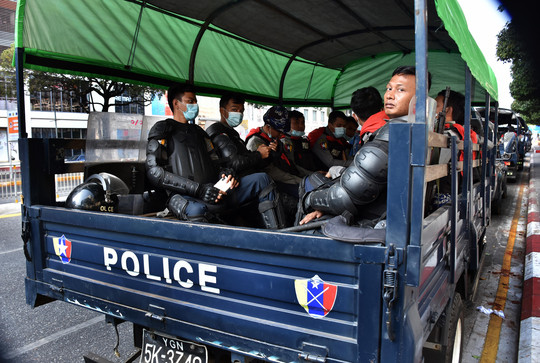Myanmar: IFJ Asia-Pacific members condemn attack on Myanmar democracy and press freedom

IFJ affiliates in the Asia-Pacific represent 29 national journalist organisations, representing more than 70,000 journalists across the region.
IFJ and its affiliates today called on Myanmar’s military to allow the full and free functioning of the media and to urgently lift controls that are impeding the media’s duty to inform the public, including blocks on social media platforms such as WhatsApp and Facebook.
On February 2, Myanmar’s Ministry of Information released a statement in which it alleged, “some media and citizens are spreading rumours on social media, conducting gatherings to incite rowdiness and issuing statements which can cause unrest.” “This matter damages unity with ethnic peoples and greatly harms the stability of the nation,” the statement said.
Facebook and other social media services have been completely banned until February 7 by the military to stifle dissent and consolidate power. Reporting practices common under the military junta until 2011, such as the use of pen-names to protect journalist identities, are already returning.
The political crisis in Myanmar unfolded on the morning that Myanmar’s newly-elected administration, led by Aung San Suu Kyi’s National League for Democracy (NLD) party, was due to begin the first session of parliament. The country’s military had earlier claimed allegations of voter fraud. These claims have been rejected by Myanmar’s election commission.
On February 1, Myanmar’s military detained over 45 politicians and activists, including state counsellor Suu Kyi and president Myint, declaring a state of emergency for at least one year. Soon after the military takeover, phone lines were cut and internet access was heavily impacted, almost immediately serving to undermine the capacity of journalists and media personnel to cover the unfolding political crisis.
Cyber security monitor Netblocks confirmed that internet connectivity in Myanmar fell to 50 per cent of normal levels, indicating a centrally issued telecoms blackout order. Myanmar’s state media network MRTV was unable to broadcast after the detention of government leaders. Whilst Myanmar has been plagued by internet and telephone disruptions under Aung San Suu Kyi, the military coup poses an even greater threat to press freedom and a return to military control over freedom of expression throughout the country.
The IFJ and its affiliates express grave concerns for media workers in Myanmar attempting to report, after a number of journalists have been threatened and physically assaulted. Increased surveillance and monitoring of media outlets and other civil society organisations is also a key concern.
Within hours of the coup, a photographer was beaten by ultra-nationalists celebrating the military takeover. Hiroki Kitazumi, a Japanese journalist, was kicked and punched in the face at a pro-military demonstration in Yangon on February 1. Another Japanese freelance reporter Kitazumi said “It was clear that rally participants were targeting the media”. Yangon-based freelance journalist Theurein Kyaw was beaten during a separate protest while reporting for publication Voice of Myanmar.
IFJ monitoring this week in Myanmar has documented the rapid establishment of a climate of fear among the media community, with journalists reporting of increased surveillance of news reporting and journalists admitting to self-censorship since the military overthrow of the democratically-elected government.
On February 2, the banging of pots filled the night air of the country’s capital Yangon in a noisy protest that extended for more than a quarter of an hour in the first display of public resistance to the coup.
The IFJ and its Asia Pacific affiliates said: “We, media unions and organisations in the Asia-Pacific, stand in full solidarity with our colleagues in Myanmar. We call on the military authorities who have seized power to respect freedom of the press and to allow journalists and news organisations to go about their work without interference. The best interests of the people of Myanmar are best served by the truth, not its suppression. To this end, we urge the Ministry of Information to rescind the warning it earlier issued against ‘some media and citizens’ for supposedly ‘spreading rumors and inciting unrest’ and to urgently restore citizen’s access to information on all platforms.”
Signed:
Afghan Independent Journalists Association (AIJA)
Aliansi Jurnalis Independen (AJI)
Association of Taiwan Journalists (ATJ)
Cambodian Association for the Protection of Journalists (CAPJ)
CamboJA
E tū – New Zealand
Federation of Media Employees’ Trade Unions (FMETU)
Federation of Nepali Journalists (FNJ)
Free Media Movement (FMM) – Sri Lanka
Indian Journalists’ Union (IJU)
International Federation of Journalists (IFJ)
Journalists’ Association of Korea (JAK)
Media Asosiesen blong Vanuatu (MAV)
Media Entertainment Arts Alliance (MEAA) – Australia
National Union of Journalists – India (NUJI)
National Union of Journalists Malaysia (NUJM)
National Union of Journalists of the Philippines (NUJP)
Nepal Press Union (NPU)
Pakistan Federal Union of Journalists (PFUJ)
Sri Lanka Working Journalists Association (SLWJA)
Timor-Leste Press Union (TLPU)
For further information contact IFJ Asia – Pacific on ifj@ifj-asia.org
The IFJ represents more than 600,000 journalists in 140 countries
Twitter: @ifjasiapacific, on Facebook: IFJAsiaPacific and Instagram


